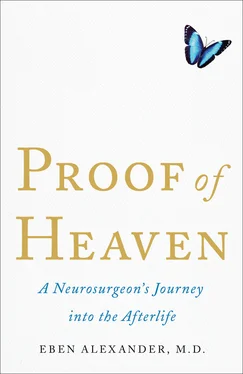I was flipping back and forth between being present there in the ICU and being out of my mind in the adrenaline-soaked delusions of a gorgeous skydive.
I was between nutty—and getting it.
For two days I blabbered about skydiving, airplanes, and the Internet to all who would listen. As my physical brain gradually recovered its bearings, I entered a strange and exhausting paranoid universe. I became obsessed with an ugly background of “Internet messages” that would show up whenever I closed my eyes, and that sometimes appeared on the ceiling when they were open. When I shut my eyes I heard grinding, monotonous, anti-melodious chanting sounds that usually went away when I opened them again. I kept putting my finger in the air, pointing just like ET, trying to guide the Internet ticker flowing past me, in Russian, Chinese.
In short, I was a little crazy.
It was all a little like the Realm of the Earthworm’s-Eye View, only more nightmarish, because what I heard and saw was laced with the trappings of my human past (I recognized my family members, even when, as in Holley’s case, I didn’t remember their names).
But at the same time it completely lacked the astonishing clarity and vibrant richness—the ultra-reality—of the Gateway and the Core. I was most definitely back in my brain.
Despite that initial moment of seemingly full lucidity when my eyes first opened, I soon once again had no memory of my human life before coma. My only memory was of where I had just been: the rough, ugly Realm of the Earthworm’s-Eye View, the idyllic Gateway, and the awesome heavenly Core. My mind—my real self—was squeezing its way back into the all too tight and limiting suit of physical existence, with its spatiotemporal bounds, its linear thought, and its limitation to verbal communication. Things that up until a week ago I’d thought were the only mode of existence around, but which now showed themselves as extraordinarily cumbersome limitations.
Physical life is characterized by defensiveness, whereas spiritual life is just the opposite. This is the only explanation I could come up with to explain why my reentry had such a strong paranoid aspect to it. For a stretch of time I became convinced that Holley (whose name I still didn’t know but whom I somehow recognized as my wife) and my physicians were trying to kill me. I had further dreams and fantasies about flight and skydiving—some of them extremely long and involved. In the longest, most intense, and almost ridiculously detailed of these, I found myself in a South Florida cancer clinic featuring outdoor escalators where I was pursued by Holley, two South Florida police officers, and a pair of Asian ninja photographers on cable pulleys.
I was in fact going through something called “ICU psychosis.” It’s normal, even expected, for patients whose brains are coming back online after being inactive for a long period. I’d seen it many a time, but never from the inside. And from the inside it was very, very different indeed.
The most interesting thing about this session of nightmares and paranoid fantasies, in retrospect, is that all of it was indeed that: a fantasy. Portions of it—in particular the extended South Florida ninja nightmare—were extremely intense, and even outright terrifying while happening. But in retrospect—indeed, almost immediately after this period ended—it all became clearly recognizable as what it was: something cooked up by my very beleaguered brain as it was trying to recover its bearings. Some of the dreams I had during this period were stunningly and frighteningly vivid. But in the end they served only to underline how very, very dissimilar my dream state had been compared with the ultra-reality deep in coma.
As for the rockets, airplanes, and skydiving themes that I imagined so consistently, they were, I later realized, quite accurate from a symbolic point of view. Because the fact was that I was making a dangerous reentry from a place far away, to the abandoned but now once again functional space station of my brain. One could hardly ask for a better earthly analogy for what happened to me during my week out of body than a rocket launch.
Bond wasn’t the only one having difficulty accepting the decidedly kooky person I was during those first days back. The day after I recovered consciousness—Monday—Phyllis called Eben IV on his computer using Skype.
“Eben, here’s your dad,” she said, turning the video camera toward me.
“Hi, Dad! How’s it going?” he said cheerfully.
For a minute I just grinned and stared at the computer screen. When I finally spoke, Eben was crushed. I was painfully slow in my speech, and the words themselves made little sense. Eben later told me, “You sounded like a zombie—like someone on a bad acid trip.” Unfortunately, he had not been forewarned about the possibility of an ICU psychosis.
Gradually my paranoia abated, and my thinking and conversation became more lucid. Two days after my awakening, I was transferred to the Neuroscience Step-down Unit. The nurses there gave Phyllis and Betsy cots so that they could sleep next to me. I trusted no one but the two of them—they made me feel safe, tethered to my new reality.
The only problem was that I didn’t sleep. I kept them up all night, going on about the Internet, space stations, Russian double agents, and all manner of related nonsense. Phyllis tried to convince the nurses that I had a cough, hoping a little cough syrup would bring on an hour or so of uninterrupted sleep. I was like a newborn who did not adhere to a sleep schedule.
In my quieter moments, Phyllis and Betsy helped pull me slowly back to earth. They recalled all kinds of stories from our childhood, and though by and large I listened as if I were hearing them for the first time, I was fascinated all the same. The more they talked, the more something important began to glimmer inside me—the realization that I had, in fact, been there for these events myself.
Very quickly, both sisters told me later, the brother they had known became visible again, through the thick fog of paranoid chatter.
“It was amazing,” Betsy later told me. “You were just coming out of coma, you weren’t at all fully aware of where you were or what was going on, you talked about all kinds of crazy stuff half the time, and yet your sense of humor was just fine. It was obviously you . You were back!”
“One of the first things you did was crack a joke about feeding yourself,” Phyllis later confided. “We were prepared to have fed you spoonful by spoonful for as long as it took. But you’d have none of it. You were determined to get that orange Jell-O into your mouth on your own.”
As the temporarily stunned engines of my brain kicked back in ever further, I would watch myself say or do things and marvel: where did that come from? Early on, a Lynchburg friend named Jackie came by to visit. Holley and I had known Jackie and her husband, Ron, well, having bought our house from them. Without my willing them to do so, my deeply ingrained southern social graces kicked in. Seeing Jackie, I immediately asked, “How’s Ron?”
After a few more days, I started having occasional genuinely lucid conversations with my visitors, and again it was fascinating to see how much of these connections were automatic and did not require much effort on my part. Like a jet on autopilot, my brain somehow negotiated these increasingly familiar landscapes of human experience. I was getting a firsthand demonstration of a truth that I’d known very well as a neurosurgeon: the brain is a truly marvelous mechanism.
Of course, the unspoken question on everybody’s mind (including mine in my more lucid moments) was: How well would I get? Was I really returning in full, or had the E. coli done at least some of the damage all the doctors had been sure it would do? This daily waiting tore at everyone, especially Holley, who feared that all of a sudden the miraculous progress would stop, and she would be left with only a portion of the “me” she had known.
Читать дальше












